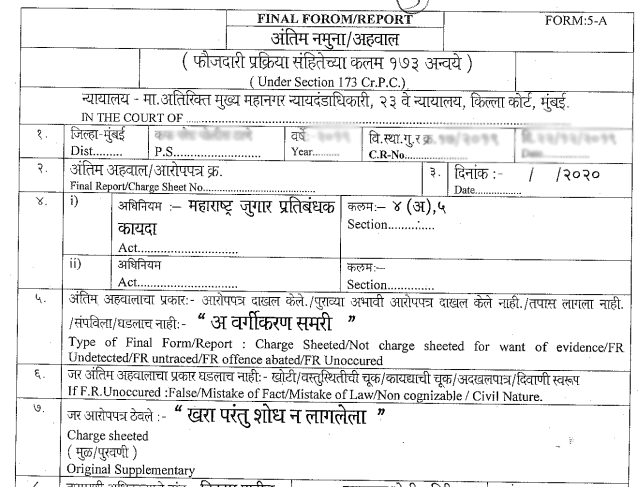This article explains what an “A Summary”, “B Summary”, “C Summary” Report is and what impact it has on a criminal case in India.
Many times we hear that the Police has filed a “Summary Report” and closed a Criminal Case or let off a criminal. But what do these summary reports or cases mean?
“A Summary” Case
- where the Magistrate classifies the case as true but undetected
- where there is no clue whatsoever about the culprits or property or when the accused is known but there is no evidence to justify his being sent up to the Magistrate for trial
“B Summary” Case
- where the Magistrate classifies the case as maliciously false
- When there is no evidence or prima facie case against the accused
- Applicable when false or frivolous cases are filed
- B Summary Report is filed by the Police in such a matter
- Usually a final report
- Will lead to acquittal of the accused, upon acceptance by the Court
- the police have to become the complainant and register a case against the original complainant, stating that he had complained to the police with malicious intent
“C Summary” Case
- When the case is neither true nor false
- C Summary report is issued by the Police in such a matter
- When the criminal case was filed due to mistake of facts or the offence complained about is of a civil nature
Who can file this Summary report?
The Investigating Officer has the authority to file a Summary report and close the case.
Under which law do these summary reports come?
These summary reports / final reports come under THE BOMBAY POLICE MANUAL1959 (Containing the Rules under the Bombay Police Act, XXII of 1951,the Bombay Police (Extension and Amendment) Act, XXXIV of 1959 and other Departmental Regulation.) VOLUME III.
219. Final Reports.-
(1) When there is no sufficient evidence to justify the forwarding of the accused to a Magistrate, the Police Station Officer or the investigating officer will release the accused.person on bail, if he is in custody.
(2) The Police Station Officer will then submit a final report to the Magistrate empowered to take cognizance of an offense on a Police report through the Superintendent of Police or the Sub-Divisional Police Officer, as the case may be, in the following three classes of cases:-
(a) Those in which it appears from the Police investigation that no offense has been committed.
(b) Those in which it appears from the Police investigation that only a non-cognizable offence has been committed.
(c) Those in which there are grounds for believing that an offence has been committed, but in which, in the opinion of the officer-in-charge of the police Station, there are not sufficient grounds to investigate or there is not sufficient evidence to justify sending anyone for trial, or in which the offender is not known or cannot be arrested and sent for trial.In cases referred to the Police by a Magistrate, the final report will be sent direct to the Magistrate.
(3) The final report should be written up carefully by the officers in-charge of the Police Station personally and should be accompanied by all the case papers numbered and indexed methodically. If the accused has been released on bail, the Magistrate should be requested to cancel the bail bond. He should also be requested to pass orders regarding the disposal of property attached, unless any of the articles, e. g., blood stained clothes, are required for further use in true but undetected cases. A request should also be made to the Magistrate to classify the case and to issue an appropriate summary of his order,viz. :-
“A” True, undetected (where there is no clue whatsoever about the culprits or property or where the accused in known but there is no evidence to justify his being sent up to the Magistrate (for trial).
“B” Maliciously false.
“C” Neither true nor false, e. g., due to mistake of fact or being of a civil nature.
“Non-cognizable” Police investigation reveals commission of only a non-cognizable offence.
(4) A Superintendent of Police or a Sub-Divisional Officer is not bound to forward a final report to the Magistrate immediately. He may of his own motion direct further enquiry or he may for special reasons permit a case to remain pending under investigation.
(5) When any further investigation is ordered and made subsequent to the submission of the final report the papers should, at each stage up to final disposal, be sent though the Superintendent of Police or the Sub-Divisional Officer. In urgent cases however, the Magistrate may return the papers,direct to the investigating officer.
(6) When a final report of an officer-in-charge of a Police Station is returned to him for further investigation or other purpose, the date of the submission of the final report in its last and complete form should be taken as the date of its submission to the Magistrate for the purpose of determining, the beginning of the period of 14 days within which a summary of the Magistrate’s final order should be sent
(7) It is not competent to a Magistrate to return investigating officer’s report made to him under Section 173, Criminal Procedure Code, with an order to make a case against the accused and to send it up for trial. If the Magistrate considers that there is a prima facie case against the accused he should take action under Section 204 of the Code.
Also section 173 of the Code of Criminal Procedure governs police reports as follows:
173. Report of police officer on completion of investigation.
(1) Every investigation under this Chapter shall be completed without unnecessary delay.
(2) (i) As soon as it is completed, the officer in charge of the police station shall forward to a Magistrate empowered to take cognizance of the offence on a police report, a report in the form prescribed by the State Government, stating-
(a) the names of the parties;
(b) the nature of the information;
(c) the names of the persons who appear to be acquainted with the circumstances of the case;
(d) whether any offence appears to have been committed and, if so, by whom;
(e) whether the accused has been arrested;
(f) whether he has been released on his bond and, if so, weather with or without sureties;
(g) whether he has been forwarded in custody under section 170.
(ii) The officer shall also communicate, In such manner as may be prescribed by the State Government, the action taken by him, to the person, if any, by whom the information relating to the commission of the offence was first given.
(3) Where a superior officer of police has been appointed under section 158, the report shall, in any case in which the State Government by general or special order so directs, be submitted through that officer, and he may, pending the orders of the Magistrate, direct the officer in charge of the police station to make further investigation,
(4) Whenever it appears from a report forwarded under this section that the accused has been released on his bond, the Magistrate shall make such order- for the discharge of such bond or otherwise as he thinks fit.
(5) When such report is in respect of a case to which section 170 applies, the police officer shall forward to the Magistrate alongwith the report-
(a) all documents or relevant extracts thereof on which the prosecution proposes to rely other than those already sent to the Magistrate during investigation;
(b) the statements- recorded under section 161 of all the persons whom the prosecution proposes to examine as its witnesses.
(6) If the police officer is of opinion that any part of any such statement is not relevant to the subject- matter of the proceedings or that its disclosure to the accused is not essential in the interests of justice and is inexpedient in the public interest, he shall indicate that part of the statement and append a note requesting the Magistrate to exclude that part from the copies to be granted to the accused and stating his reasons for making such request.
(7) Where the police officer investigating the case finds it convenient so to do, he may furnish to the accused copies of all or any of the documents referred to in sub- section (5).
(8) Nothing in this section shall be deemed to preclude further investigation in respect of an offence after a report under sub- section (2) has been forwarded to the Magistrate and, where upon such investigation, the officer in charge of the police station obtains further evidence, oral or documentary, he shall forward to the Magistrate a further report or reports regarding such evidence in the form prescribed; and the provisions of sub- sections (2) to (6) shall, as far as may be, apply in relation to such report or reports as they apply in relation to a report forwarded under sub- section (2).


can the police file a b summary report even though medical report was provided as proof the accused is an ex police personnel.
my brother was blackmailed by groups and he went missing after giving details of the culprits. however, they filed a false case under B report. Is there any time limit for the C report to be issued. Since 3 months my brother is missing, and even before any case was filed.
A good classification and useful informations. Thanks.
A very good portal of legal awareness and supporting details.
One lady she is suffering delusion she is compliant aganist me sexul abused but police people produced to mc with B report
One of my anemi he is taken unauthoriselly and pulished by social website at moment i am mendaly worrying because this is not proper compliant
Pl give me a advice regading this alligator
All reports normal
Tks
Very important information shared.
Police has the evidence(CCTV footages) but unable to identify the thief in the gold chain snatch incident which was happened in 2016 December.
FIR not registered in the police station at the time of incident happened as police said give the written complaint later we can file an FIR.
We have been following up with the police but still they have not recovered. My question is Can I file an FIR now?
Where this provision is mentioned are they find in cr p c or police manual or else where plz let us know
Can someone please tell me under which section of which act this is explained?
કૂબજ મહત્વની માહિતી છે